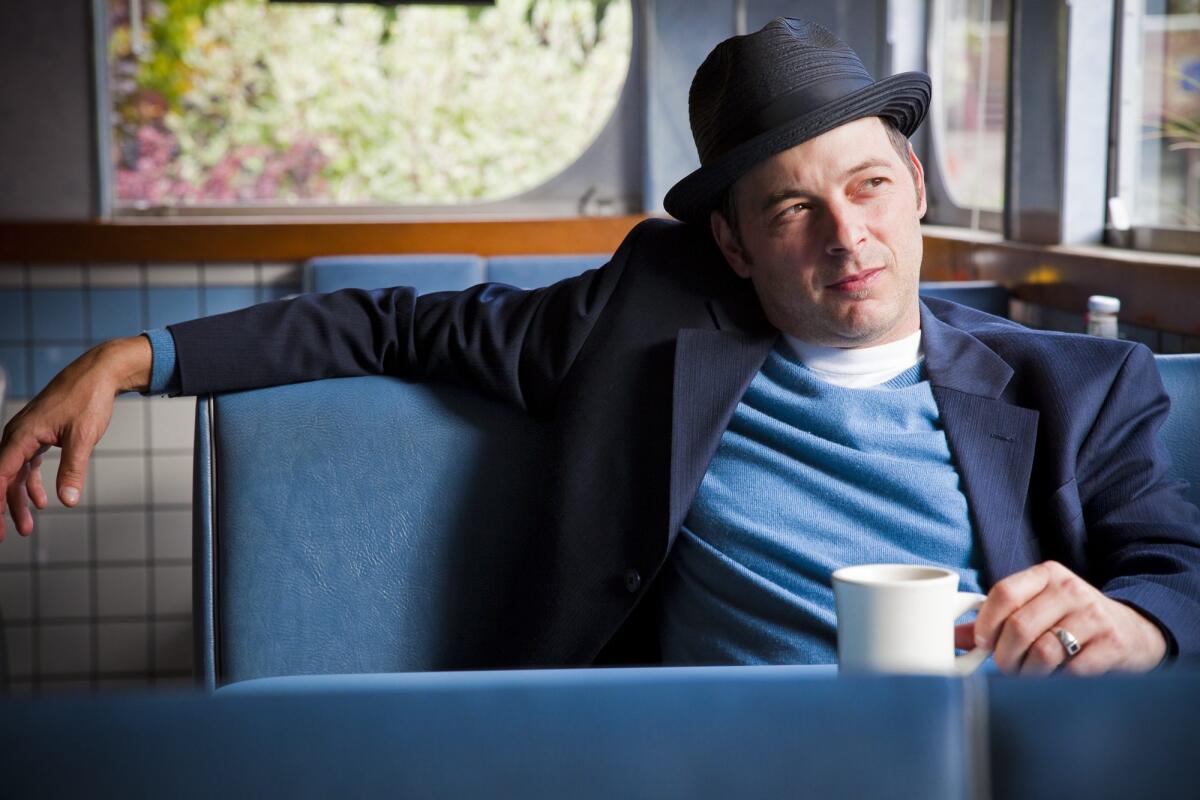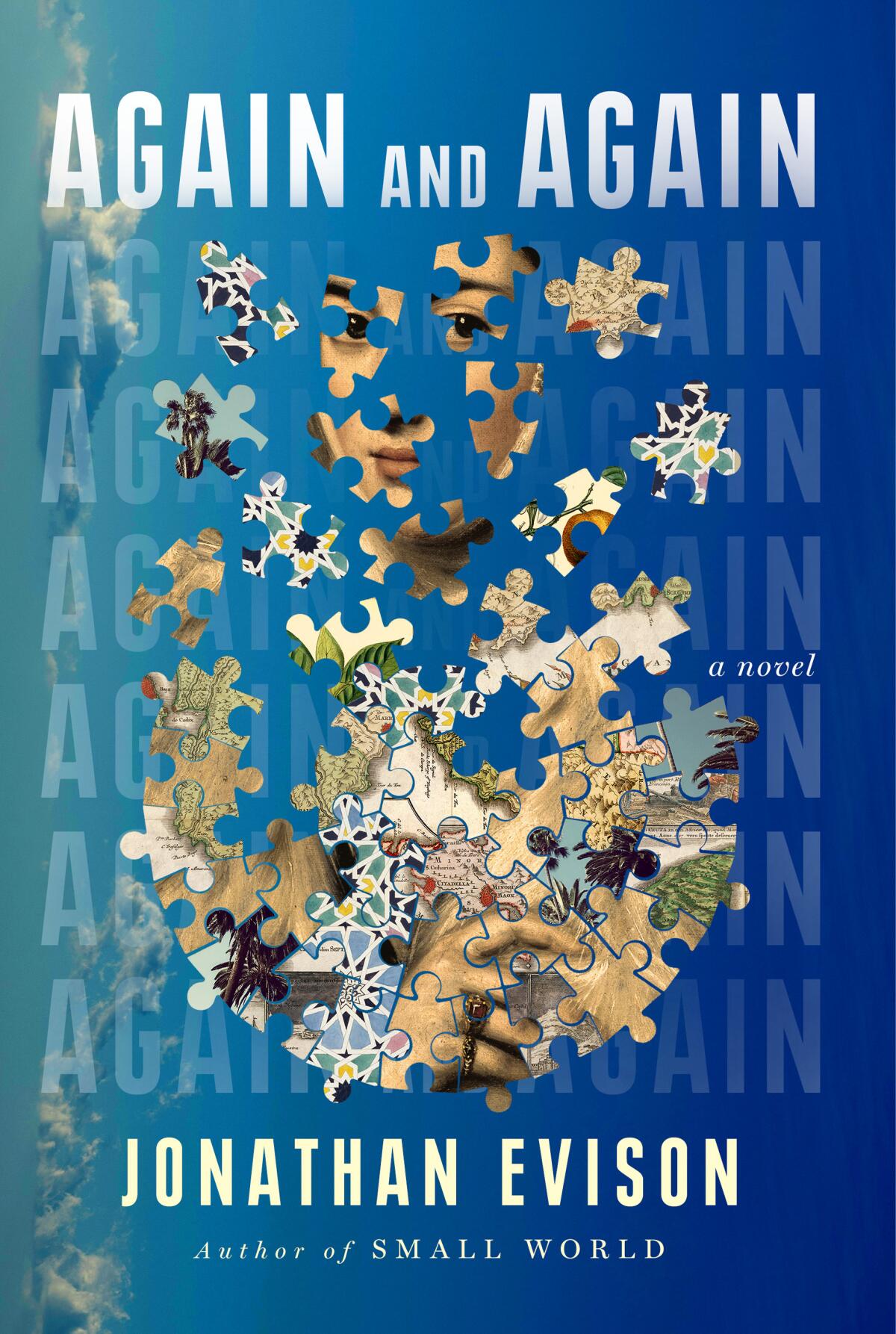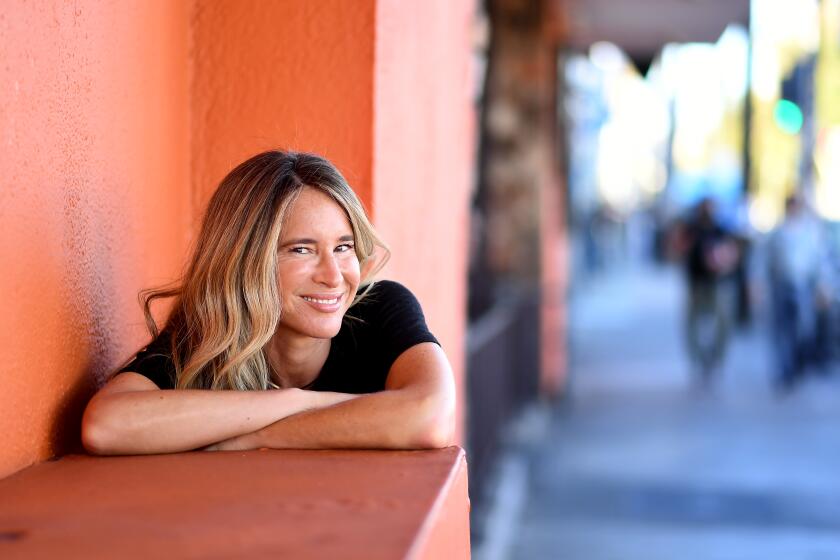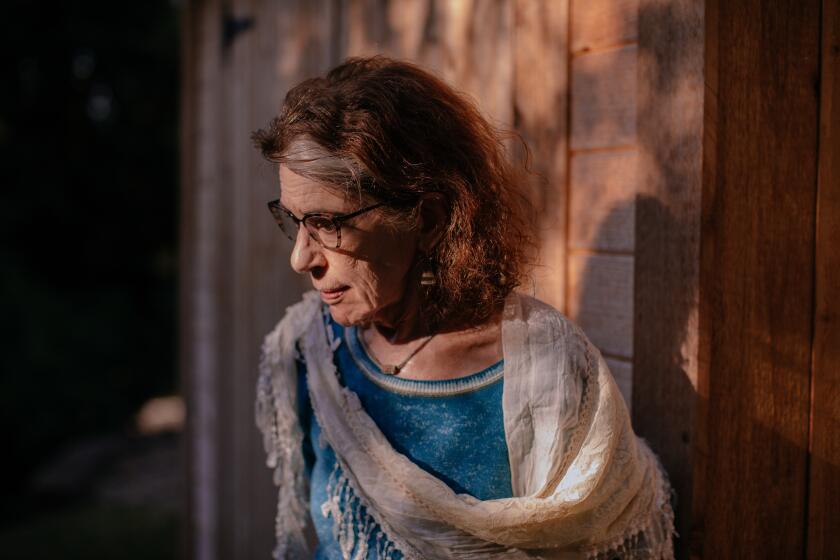Has he lived 1,110 years, or only 106? A desert retiree’s magical metafictional tour

- Share via
Review
Again and Again
By Jonathan Evison
Dutton: 336 pages, $28
If you buy books linked on our site, The Times may earn a commission from Bookshop.org, whose fees support independent bookstores.
Eugene Miles, the 106-year old hero of Jonathan Evison’s “Again and Again,” spends most of his time alone in his room, waiting to die at the Desert Greens elder care facility in the Mojave, whose surrounding mountain ranges are “beautiful [and] timeless, like me.”
Those who say life is short are misinformed, he says. “Life is not a breathless sprint to the grave, gone in a heartbeat, but an odyssey that stretches on and on into eternity.” Eugene, you see, was born during the 10th century reign of Abd al-Rahman III in the Caliphate of Córdoba.
In his eight previous novels, Evison has demonstrated a roving curiosity, his settings ranging from the prehistoric Cascade mountains to modern-day suburbia. He’s also faced the fury of book banners who objected to gay sex depicted in 2018’s “Lawn Boy.”
In “Again and Again,” Evison performs writing magic; despite its implausibility, I committed myself fully to Eugene’s 1,100-odd years of life, immersed in tales of adventure and passion that are almost too good to be true.
Melissa Broder’s previous novel, ‘Milk Fed,’ showed her talent for making reality uncanny. In ‘Death Valley,’ a woman finds redemption in a giant cactus.
Before his present incarnation, Eugene has been Euric, Pietro, Kiri, Amura and York, switching genders and continents with every rebirth. He also inhabited a cat — Whiskers — who lived as Oscar Wilde’s feline companion and matched his owner’s wit as he observed human behavior from his tufted perch.
Now, Eugene wishes to gain a final rest from the cycle, to be released from the emotional burden he has carried since his days as a cutpurse in Moorish Spain. Euric was a Visigoth, “the bastard son of a conquered tribe”; unable to find any work, he became a “not particularly good” thief, which is how he met Gaya, the one true love he would search for in every one of his succeeding lives.

Wishing now to die in peace, he has isolated himself from anyone he knew as Eugene. Without a visitor in eight years, he’s lonely, even if by choice. When Angel, the young housekeeper who cleans his room every night, first appears, Eugene shuns him, but eventually they form a bond cemented by Angel’s eagerness to hear his tales.
There is a long Western tradition of nested stories told to keep the world at bay, going as far back as Sheherazade. In Giovanni Boccaccio’s 14 century work “The Decameron,” 10 people who have fled Florence during the Black Death spin stories to repel the darkness of despair.
Very much in that tradition, “Again and Again” is a novel mirroring the experience of lockdown. All too aware of impending death, Eugene spins stories to draw the young man closer to him. Thus the two realities — everyday life in a care home and Eugene’s centuries-spanning-tales — play against each other. I was gripped by both.
As Eugene informs him, Gaya rescued Euric at great risk to herself after he cut the purse of a very powerful man. Euric was smitten but suspicious, as Gaya belonged to a rebel group bent on driving out their Moorish conquerors.
Eugene entertains Angel as the younger man cleans the room, and eventually the two men meet for daily lunches. Angel has problems of his own — he has alienated his pregnant girlfriend — and Eugene offers romantic advice gleaned from his many lives. Their friendship becomes a give and take as the two men support each other during difficult times.
Eventually, Evison introduces the character of Wayne Francis, a mental health professional whose job is to monitor the psychiatric well-being of Desert Greens’ residents. Wayne’s voice clashes jarringly with Eugene’s symphony of stories. Despite Wayne’s gentle questions, I found myself resentful of him; he was breaking the spell.
“All I’ve ever wanted in any of my incarnations was to connect with another wholly and authentically,” says Eugene, thinking back on Gaya. “Deprived of meaningful connections, we are ciphers at best, and at worst invisible. To be seen, to be accepted, warts and all, that has been my greatest aspiration for over a thousand years. To be adored for my flaws.” A cipher is also a secret code, a means of hiding information even as it is communicated.
Wayne has his own reasons for questioning Eugene (no spoilers), and his role as interlocutor takes the novel to its own fantastical, delightful conclusion. Wayne functions as the voice of Evison’s readers — or at least their innate skepticism.
Cai Emmons, a prolific novelist of the West, died Monday, after running a blog after her ALS diagnosis that has much to teach us about facing the inevitable.
The power of the author grows with his ability to suspend disbelief. Writers do this through a combination of specific details, sensory descriptions of a world that comes to life in the reading or listening. But all authors are by definition unreliable narrators, imposing meaning and structure on a world full of chaos and miscommunication. A skilled one can reach inside us and widen our emotional worlds.
Eugene is such a writer — which is to say he can spin a good yarn. It’s how he’s made connections with those in his life, including the woman he loved in 20th century Los Angeles. But now she is dead, and he is dejected.
And so he — and Evison — arrive at an impasse. To gain the intimacy he longs for, he must set aside his beautifully crafted tales and pick up the more prosaic, imperfect medium of shared personal truths. To transform his listeners into friends, he must embrace the risk of being misunderstood.
The joy of watching Evison braid together multiple stories from Eugene’s lives (and the 105 years of this existence) is akin to witnessing a master carpet weaver work out a fantastically intricate rug. Look closely enough, and you’ll see the understitch in every storyteller’s pattern: the desire to be admired and loved for the beautiful thing you’ve made.
I would gladly have spent many more pages with the magical tapestry of “Again and Again.” In revealing the tricks of his trade, its author exposes the tender heart of his craft.
Berry is a critic living in Oregon.
More to Read
Sign up for our Book Club newsletter
Get the latest news, events and more from the Los Angeles Times Book Club, and help us get L.A. reading and talking.
You may occasionally receive promotional content from the Los Angeles Times.








